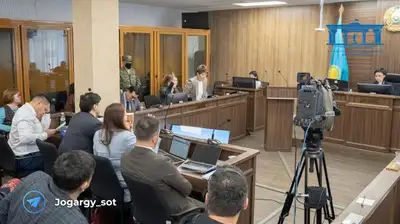Employment Termination Rules in Uzbekistan (Jamol Ryskiyev, Partner Ryskiyeva and Partners Law Firm)
 Фото: zakon.kz
Фото: zakon.kz
Employment Termination Rules in Uzbekistan
The Uzbek Labor Code is generally pro-employee and provides a wide range of guarantees to employees, including just-cause termination of employment agreements. According to Article 97 of the Labor Code the employment agreement may be terminated:
1) by mutual agreement of both parties (employer and employee);
2) by initiative of one of the parties (employer or employee);
3) upon the expiry of the employment agreement term;
4) due to circumstances beyond the parties' control;
5) due to grounds envisaged in the employment agreement; or
6) due to non-election for a new term (failure to win a competition) or refusal to participate in an election (competition).
Termination of employment by the employer is regulated very strictly in Uzbekistan and is under control of local municipalities, civil courts and regional departments of the Ministry of Labor of Uzbekistan. Trade unions do also play significant role, however only in large-scale enterprises or enterprises where trade unions have been established.
Article 100 of the Labor Code determines the following exhaustive list of grounds which can be used by an employer to terminate an employment agreement without obtaining consent of employee:
1) Change of technological, production or work process, decreasing of volumes of work which have led to changes in (i) the number of employees (redundancy) or (ii) character of works or (iii) liquidation of an enterprise;
2) Incompatibility of an employee due to low qualification or illness. Herewith there must be a sufficient evidence of incompatibility, i.e. evidence of low quality work etc… Regarding the medical reason, it cannot be used if illness does not cause inability of an employee to perform his/her tasks in due course. However, this ground can be used if there is a medical conclusion prohibiting an employee to perform his/her tasks or if there is a danger that other employees or customers may get infected with the same illness;
3) Systematic breach of duties by an employee. A systematic breach is a breach of duties committed during one calendar year from the date when this employee has been penalized on the grounds of internal employment policies (disciplinary sanction, material sanction);
4) A significant breach of professional duty. This type of breaches must be described in internal employment policies;
5) Termination of employment with part-time employees if the employer hires a full-time employee for this position;
6) Termination of employment with head of organization, his/her deputy and chief accountant due to change of owner of this organization. This right is enforceable for only three months from the date when a new owner has purchased a particular organization; and finally
7) Reaching pension age by an employee provided that employee has acquired right for receiving a state pension (pensioner’s ID).
The above mentioned seven grounds is the exhaustive list of grounds which can be used by employers to terminate employment agreements with their employees.
It should be noted that employer is not allowed to terminate employment agreement unilaterally if the employee is on a sick-leave or other leave, except on the grounds of employer’s liquidation. Moreover, article 237 of the Labor Code stipulates that the employer is not entitled to terminate employment agreement unilaterally with (except on the grounds of company liquidation):
1) a pregnant woman;
2) a woman having child under 3-years old.
Please note that a woman on a parental leave is allowed to return to her work before expiry of her parental leave, and the employer is not allowed to terminate employment agreement with her even for gross violation of internal rules/policies until her child reaches 3-years old (except on the grounds of employer’s liquidation). However, in case of a gross violation, the employer is allowed to apply disciplinary penalty in the form of a reprimand or fine with respect to such woman.
In case of company liquidation, the employer shall arrange employment of above mentioned women in other company(ies). Moreover, it does not matter:
1) what position woman has during her pregnancy;
2) if woman had a temporary or permanent employment agreement. In case of a temporary agreement, it will be subject to automatic renewal until expiry of leave periods, as explained above.
A redundancy for change of technological, production or work process, decreasing of volumes of work must be well grounded.
Pursuant to the Uzbek labor legislation the employer shall agree the termination of the employment on its initiative with the company’s representative body (e.g. Trade Union) if such agreement is required by the company’s collective agreement. However, the employer shall notify a trade union or another representative body of employees about potential large-scale dismissal not later than two months, and shall carry out consultations to soften consequences of dismissal. Also, the employer shall notify a local state labor agency about upcoming large-scale dismissal not later than two months, and provide information about each employee’s profession, specialty, qualification and salary amount.
Priority Employees: the Labor Code contains concept of priority right to retain employment with certain categories of employees. In particular, Article 103 of the Labor Code specifies that in case of terminating employment agreement due to changes in technology or organisation of production and work, reduction of volume of work entailing changes in personnel (staff) or the nature of work, the priority right to retain employment shall be granted to employees with the highest qualifications and productivity. In the event of equal qualifications and productivity, preference shall be given to:
(i) employees with two or more dependants;
(ii) persons who have no other employees with an independent income in the family;
(iii) employees with a long length of service at that enterprise;
(iv) employees improving their qualifications part-time for a relevant specialisation at higher and secondary special educational establishments, or persons who graduated part-time from higher or secondary special professional and technical educational establishments within two years after graduating, provided they work with that specialisation;
(v) persons who have suffered an injury or work-related illness at that enterprise;
(vi) war invalids, participants in the war and persons equivalent to them;
(vii) persons who are suffering or have recovered from radiation and other diseases associated with an increased level of radiation caused by accidents at nuclear facilities; disabled people whose disability occurred due to accidents at nuclear facilities; participants in clean-up operations after such catastrophes and accidents, and persons who were evacuated or relocated from such zones and persons equivalent to them.
The collective agreement of the Company, if any, may stipulate other circumstances which entail preference in retaining employment.
Notice Period: The Labor Code is specific on notification terms, as an employer shall be obliged to notify an employee in writing (and the employee shall sign for receipt) of his intention to terminate the employment agreement at least two months prior to the termination of an employment agreement in connection with changes in technology, organisation of production and labor, reduction of volume of work entailing changes in personnel (staff) or in the nature of work, or in connection with the liquidation of the enterprise. An employee and employer may agree that the 2-month notice period may be substituted by an average salary of an employee for two months with immediate termination.
Procedure of notifying employees: The employer company is not obliged to notify the employees of restructurings in the company. However, the employees whose positions are subject to redundancy due to such restructuring shall be notified in written form two months prior the termination of employment agreements due to such redundancy. The notification may be given only by the person authorized to terminate the employment agreements with employees. This notification period may be replaced with monetary compensation of equivalent amount. Within the notification period the employee shall be allowed not to come at work at least one day in a week in order to look for another job.
Uzbek legislation does not provide specific form of such notification. However, we assume that it shall contain the date of termination of the employment agreement and the reasoning of further redundancy of his position.
The notification shall be signed by notifying person and the employee in witness of being notified. In case when the employee refuses to sign the notification the employer shall draw up statement of notice in presence of 3 persons. In case of large-scale redundancy it is advised to appoint a commission consisting of 3 persons or more including 1 representative of Trade Union to record the fact of notification.
Severance Pay: Pursuant to Articles 109 and 67 of the Labor Code, an employee who is terminated due to paragraph 1 of Article 100 is entitled to receive severance pay from the employer calculated by reference to the average monthly earnings of the employee. Average monthly earnings are currently calculated by reference to the earnings of an employee during the last three full months worked before the date of termination and includes the base salary.
The first severance payment of one month’s average monthly salary must be made not later than the date of termination. In addition, the employee is entitled to receive from the employer a second and third severance payment (each equal to one month’s average monthly salary), in addition to the severance payment on the date of termination, in the event that such employee does not commence other employment during the second or third month after the date of termination and is registered with the relevant local state labor agency within 10 calendar days as a person seeking for job. If the employee commences new employment before the second or third severance payment is due, the severance payment shall be discontinued. Thus, the total amount of maximum severance payment an employee is legally entitled to receive is three months of his average monthly earnings.
Procedure of making employee redundant (termination): Upon the expiration of two months notification period the employment agreement with employee shall be terminated. The employer shall issue the order on termination with indication of all payments due to employee, including the salary and compensation for unused leaves.
Jamol Ryskiyev, Partner
Ryskiyeva and Partners Law Firm






